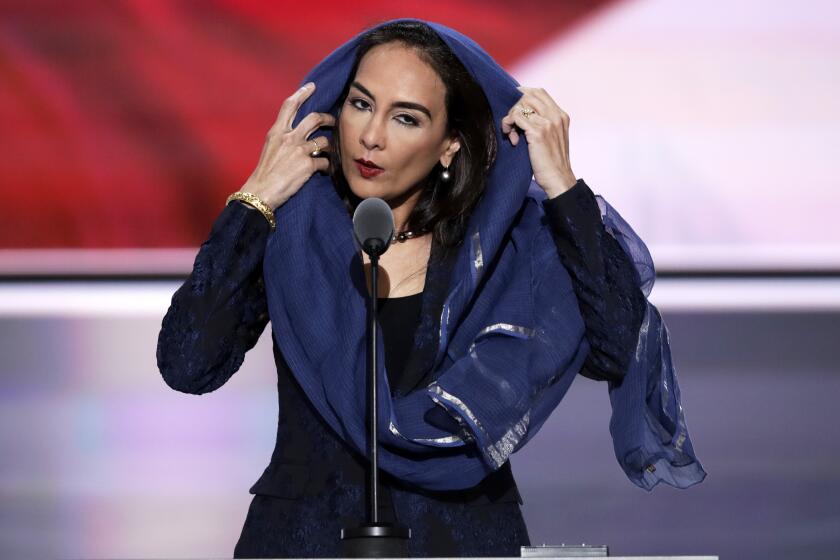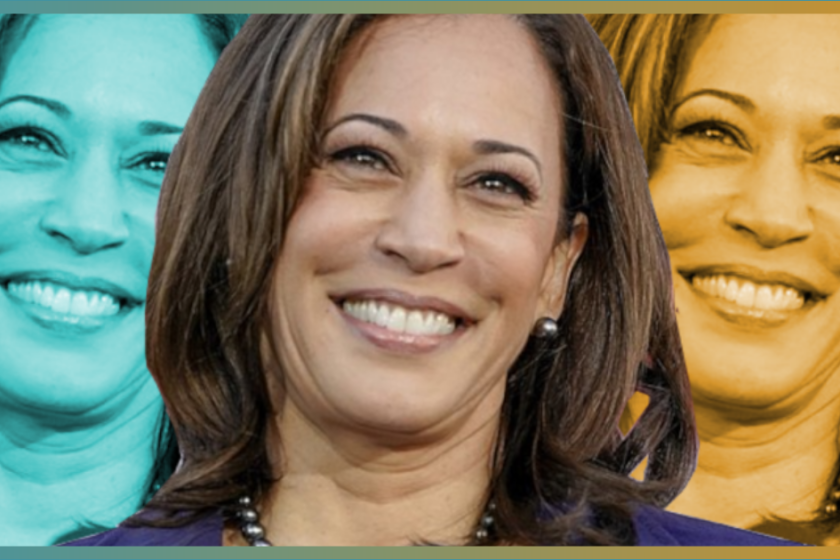Column: A signal from Biden and boost for Kamala Harris as Democrats remake 2024 primary calendar

- Share via
Perhaps you missed it, what with holiday shopping, World Cup soccer and the big political news that Donald Trump wants to run the Constitution through a shredder and make himself dictator.
Last week, at the behest of President Biden, the Democratic Party began considering a major overhaul of its presidential nominating process, proposing to recast the lineup of states privileged to cast the first votes of the 2024 election. The intention is greater diversity.
Iowa, which has traditionally begun the balloting with its wintry caucuses, would be out. South Carolina, where Biden resuscitated his gasping 2020 campaign with a landslide victory, would be in as host of the nation’s leadoff primary.
Nevada and New Hampshire — sharing the day — would vote next, followed by Georgia and Michigan. (Sorry, California, you’d still be nothing but a big, forlorn afterthought, most likely voting after the nomination is effectively decided.)
Biden, who will be 82 years old by the time he would take the oath for a second term, has not committed to seeking reelection. But his move to reshape the political calendar to his liking is not the action of a man looking to spend his golden years puttering with the grandkids in Rehoboth Beach.
An announcement of the president’s intentions is expected sometime early in the new year.
If Biden doesn’t run, the likeliest beneficiary of the proposed calendar switch is his often-dismissed understudy, Vice President Kamala Harris.
San Francisco attorney Harmeet Dhillon has promoted Trumpism and conspiracy theories that helped undermine the party in California and across the country.
Harris, 58, ran a notably lousy presidential campaign in 2020, which left many Democrats soured on her future prospects. Her tenure as vice president hasn’t won Harris a great many new fans.
“We Democrats shouldn’t kid ourselves,” said Garry South, a longtime party strategist who has observed Harris’ political career up close in California and salutes her making history as the first female, Black and Asian vice president.
“She’s our functional equivalent of Dan Quayle,” he continued. “Adequate and useful to help get a president elected, but totally incapable of running for president herself, as she’s amply demonstrated.”
That remains to be seen.
Though it may cause some Democrats heartburn, Harris is the clear front-runner to lead the party should Biden stand aside or — how to put this delicately — be otherwise absent from the presidential ticket in 2024.
Some of that is simply the nature of her job.
While derided for the subservience it requires, the vice presidency is a peerless platform from which to launch a White House bid. The position offers universal name recognition and, behind the scenes, a chance to connect with officeholders and political activists around the country, forging connections and collecting political IOUs that could prove invaluable to a future campaign.
True, there is no guarantee of success. (See Quayle, circa 2000.) But Harris also benefits from her ceiling-shattering status and strong appeal to Black voters, especially Black women, who just happen to be the backbone of today’s Democratic Party.
That’s why the calendar change seems to play to Harris’ particular advantage, even if that was not something Biden purposely set out to accomplish by re-engineering the nominating process.
“Who’s he more indebted to, Kamala Harris or Jim Clyburn?” gibed an insider familiar with the president’s decision-making, who wished to remain anonymous to avoid roiling relations with the vice president. The reference was to the Democratic congressman, a giant in South Carolina politics, whose timely endorsement proved vital to Biden’s 2020 resurrection.
Unlike Iowa and New Hampshire, which have voted one-two for the last several decades, South Carolina has a substantial Black population. In 2000, 56% of voters in South Carolina‘s Democratic primary were Black, and most of them were women. Georgia and Michigan also have significant Black populations.
That doesn’t mean Harris would automatically win every Black vote. But it does offer a substantial base upon which to build, and the opportunity, if she were to rack up early victories, to dispel some of the doubts about the vice president’s political mettle and electability.
“If you were to design a presidential primary calendar to maximize the benefit to Harris, the one Biden rolled out a few days ago is it,” Chris Moyer — who worked in 2020 for a rival, New Jersey Sen. Cory Booker — wrote in a recent analysis. “Despite her overall approval sitting even below Biden’s dismal number, she remains popular with the Black voters who now have the prized first spot in the process.”
The Times is tracking the latest national opinion polls on the favorability of Vice President Kamala Harris.
None of the changes have been finalized.
The full membership of the Democratic National Committee has to approve the new calendar, and officials in Iowa and New Hampshire insist they will continue to hold their contests ahead of other states, regardless of what national Democratic leaders wish.
Candidates would then have to decide whether to compete there, even if the party penalized the states by, say, refusing to seat Iowa and New Hampshire delegates at Democrats’ national nominating convention.
Still, it’s a good bet the president will get his way, with the early contests lining up just as Biden prefers and Harris might relish.
There is a saying in politics that demographics are destiny.
But the calendar is also consequential.
More to Read
Get the latest from Mark Z. Barabak
Focusing on politics out West, from the Golden Gate to the U.S. Capitol.
You may occasionally receive promotional content from the Los Angeles Times.













